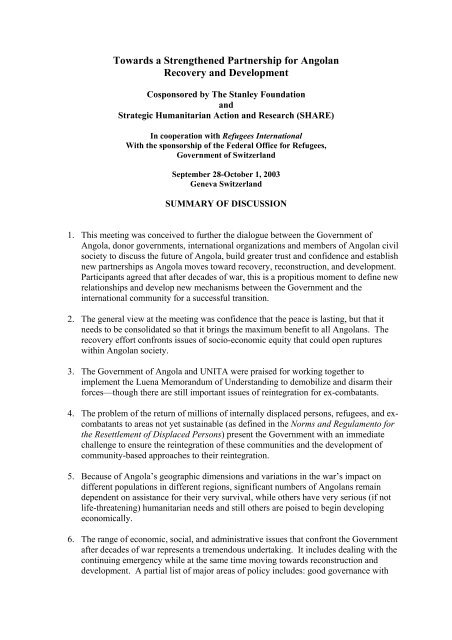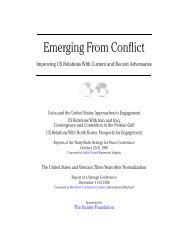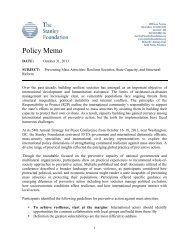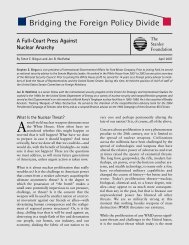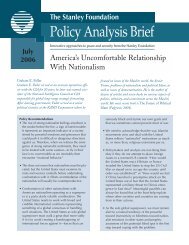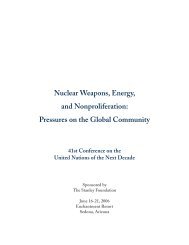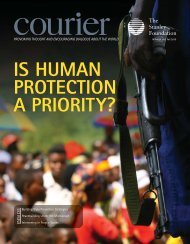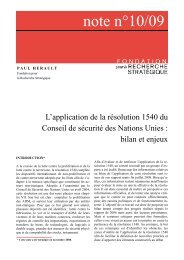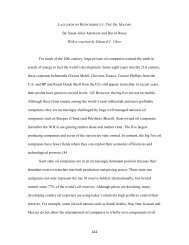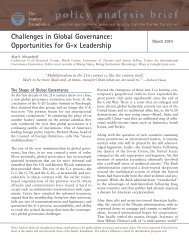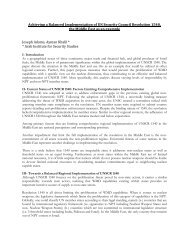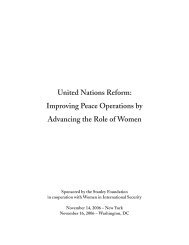Towards a Strengthened Partnership for Angolan Recovery and ...
Towards a Strengthened Partnership for Angolan Recovery and ...
Towards a Strengthened Partnership for Angolan Recovery and ...
Create successful ePaper yourself
Turn your PDF publications into a flip-book with our unique Google optimized e-Paper software.
<strong>Towards</strong> a <strong>Strengthened</strong> <strong>Partnership</strong> <strong>for</strong> <strong>Angolan</strong><strong>Recovery</strong> <strong>and</strong> DevelopmentCosponsored by The Stanley Foundation<strong>and</strong>Strategic Humanitarian Action <strong>and</strong> Research (SHARE)In cooperation with Refugees InternationalWith the sponsorship of the Federal Office <strong>for</strong> Refugees,Government of Switzerl<strong>and</strong>September 28-October 1, 2003Geneva Switzerl<strong>and</strong>SUMMARY OF DISCUSSION1. This meeting was conceived to further the dialogue between the Government ofAngola, donor governments, international organizations <strong>and</strong> members of <strong>Angolan</strong> civilsociety to discuss the future of Angola, build greater trust <strong>and</strong> confidence <strong>and</strong> establishnew partnerships as Angola moves toward recovery, reconstruction, <strong>and</strong> development.Participants agreed that after decades of war, this is a propitious moment to define newrelationships <strong>and</strong> develop new mechanisms between the Government <strong>and</strong> theinternational community <strong>for</strong> a successful transition.2. The general view at the meeting was confidence that the peace is lasting, but that itneeds to be consolidated so that it brings the maximum benefit to all <strong>Angolan</strong>s. Therecovery ef<strong>for</strong>t confronts issues of socio-economic equity that could open ruptureswithin <strong>Angolan</strong> society.3. The Government of Angola <strong>and</strong> UNITA were praised <strong>for</strong> working together toimplement the Luena Memor<strong>and</strong>um of Underst<strong>and</strong>ing to demobilize <strong>and</strong> disarm their<strong>for</strong>ces—though there are still important issues of reintegration <strong>for</strong> ex-combatants.4. The problem of the return of millions of internally displaced persons, refugees, <strong>and</strong> excombatantsto areas not yet sustainable (as defined in the Norms <strong>and</strong> Regulamento <strong>for</strong>the Resettlement of Displaced Persons) present the Government with an immediatechallenge to ensure the reintegration of these communities <strong>and</strong> the development ofcommunity-based approaches to their reintegration.5. Because of Angola’s geographic dimensions <strong>and</strong> variations in the war’s impact ondifferent populations in different regions, significant numbers of <strong>Angolan</strong>s remaindependent on assistance <strong>for</strong> their very survival, while others have very serious (if notlife-threatening) humanitarian needs <strong>and</strong> still others are poised to begin developingeconomically.6. The range of economic, social, <strong>and</strong> administrative issues that confront the Governmentafter decades of war represents a tremendous undertaking. It includes dealing with thecontinuing emergency while at the same time moving towards reconstruction <strong>and</strong>development. A partial list of major areas of policy includes: good governance with
greater transparency; consolidation of democracy; ensuring that the rights in the<strong>Angolan</strong> constitution have full effect as well as those contained in international humanrights agreements to which Angola is a party; just distribution of wealth (includingl<strong>and</strong>); <strong>and</strong> sustained economic growth based on macroeconomic stability.7. Angola’s Government, which has significant resources of its own, will naturally playthe largest role in the country’s recovery <strong>and</strong> development. The donors nonethelesshave an important role to play <strong>and</strong> need to ensure they support the Government in keystrategic areas. Donors have indicated that increased ef<strong>for</strong>ts by the Government,including more effective use of its resources as well as greater transparency, areimportant to laying the groundwork <strong>for</strong> sustained international support.8. The collective partnership <strong>for</strong> recovery—<strong>and</strong> indeed the recovery itself—will beparticularly strengthened when the Government of Angola engages in publicconsultation over key matters of policy. The current debate over the proposed l<strong>and</strong>law was cited as an example of such consultation, <strong>and</strong> participants looked <strong>for</strong>ward to asimilar round of discussions of the draft Poverty Reduction Strategy Paper (PRSP).This is part of a broader set of preparatory steps <strong>for</strong> a possible donors conference.9. A continued public airing of plans will be invaluable in setting expectations againstwhich policy <strong>and</strong> implementation can be judged, paving the way toward the normalgive-<strong>and</strong>-take of democratic governance. The Norms <strong>and</strong> Regulamento, whichparticipants recognized as a groundbreaking ef<strong>for</strong>t to incorporate internationalst<strong>and</strong>ards <strong>for</strong> the internally displaced into domestic law, can serve this function well.Concrete mechanisms <strong>for</strong> full implementation of the Government’s declared policies,however, will depend on development of stronger government administrative capacity<strong>and</strong> infrastructure, which should be a priority throughout the recovery <strong>and</strong>development ef<strong>for</strong>t.10. In the transition from humanitarian crisis to stability, one enduring asset from the warperiod is the machinery that the UN <strong>and</strong> the <strong>Angolan</strong> Government together built intoone of the world’s largest <strong>and</strong> most successful relief operations.11. At a day-to-day level, the UN-<strong>Angolan</strong> humanitarian partnership manifests a veryhealthy interplay of expectations <strong>and</strong> results through the various mechanisms <strong>for</strong>consultation, monitoring, assessment, <strong>and</strong> planning that have been developed by theGovernment, UN agencies, provincial authorities, <strong>and</strong> NGOs.12. As the UN presence shifts (including the phase out of OCHA during 2004), it will becrucial to strengthen the existing systems through which all of the local <strong>and</strong>international humanitarian actors consult, coordinate, collect data, set priorities, <strong>and</strong>mobilize resources. Because of the Government’s shortfall in capacity, it will be sometime be<strong>for</strong>e it can assume many of the functions currently filled by the UnitedNations’ specialized agencies, funds, <strong>and</strong> programs, though this should be themedium-term objective. The transfer of responsibilities <strong>and</strong> programs between UNagencies presents its own challenges, <strong>and</strong> the transition in Angola gives the agenciesan opportunity to set a new st<strong>and</strong>ard of effectiveness <strong>for</strong> the so-called “h<strong>and</strong> over.”Unless this is done well, the population itself will pay the price in an erosion ofservices, sometimes with tragic consequences. A successor to the Emergency2
Response Fund should be maintained as a device to move resources quickly to wherethey are most urgently needed <strong>for</strong> humanitarian or recovery needs.13. Humanitarian donors should seize on the consolidated appeal on transition currentlybeing discussed among the Government, the UN, <strong>and</strong> the NGOs to achieve <strong>for</strong> all<strong>Angolan</strong>s the minimum settlement conditions, including those set <strong>for</strong>th in the Norms<strong>and</strong> Regulamento.14. Indeed the <strong>Angolan</strong> Government outlined <strong>for</strong> the conference the key priorities <strong>for</strong> sucha transitional program: meeting ongoing emergency needs, increasing food selfsufficiency,ensuring safe drinking water, provision of shelter <strong>and</strong> basic survival items,distribution of seeds, fertilizer, <strong>and</strong> tools, mine clearance, reconciliation, resettlement<strong>and</strong> reintegration, <strong>and</strong> improving basic social services throughout the country such asavailability of medicine <strong>and</strong> medical attention as well as staffed <strong>and</strong> functioningschools. As the Government tackles these challenges, along with its other priorities ofstrengthening good governance <strong>and</strong> establishing solid legal frameworks, its progressshould generate long-term development assistance from donors.15. Prioritizing the special needs of women is critical not only to ensuring their survival—<strong>and</strong> thereby that of their families—but more broadly to their communities’ prospects<strong>for</strong> successful reconstruction. Populations that should be targeted <strong>for</strong> assistance <strong>and</strong>protection include: single heads of household; unaccompanied minors; women <strong>and</strong>girls <strong>for</strong>ced to live <strong>and</strong> work under the <strong>for</strong>mer UNITA <strong>for</strong>ces; <strong>and</strong> male childrenassociated with the armed <strong>for</strong>ces. Other vulnerable groups include the h<strong>and</strong>icapped,elderly <strong>and</strong> unaccompanied minors, among these, street children.16. HIV/AIDS confronts Angola with a new threat that could decimate the next twogenerations just as the war did <strong>for</strong> the past two. The isolation caused by war protectedAngola against the spread of the virus, but now increasing commerce <strong>and</strong> migrationwith regional neighbors make it possible <strong>for</strong> the disease to spread with the same speedthat is devastating other Southern African nations. The engagement <strong>and</strong> personalleadership of President of the Republic of Angola José Eduardo Dos Santos inestablishing a national commission <strong>for</strong> HIV/AIDS is an important first step. Due tothe sweeping social impact of HIV/AIDS, now massive public education programswill be needed that are tailored to the different needs of urban <strong>and</strong> rural populations. Itis important to note also that malaria <strong>and</strong> other infectious diseases cause manypreventable deaths in Angola, with the attendant impact on the fabric <strong>and</strong> productivityof communities.17. The social compact between any government <strong>and</strong> its citizens includes both the rightsto be protected by the state as well as the people’s obligation to be productive <strong>and</strong> lawabidingmembers of their communities. It was suggested that the Government <strong>and</strong>civil society can rein<strong>for</strong>ce this compact by sometimes reversing their customary rolesso that the Government highlights the rights of the citizens <strong>and</strong> civil societyemphasizes their obligations in respect to current law.18. As in any post-conflict society, Angola faces a number of difficult challenges inguaranteeing the rights of its people. For instance, a great many <strong>Angolan</strong>s lack theidentity documents that would enable them, as a practical matter, to make their claimto the rights of citizenship. The participants encouraged the Government to continue3
the process of registration without fee, which has already taken place <strong>for</strong> 160,000<strong>Angolan</strong>s. And since many areas in the country’s interior lack a functioning justicesystem, monitoring <strong>and</strong> reporting mechanisms to detect rights violations <strong>and</strong>mechanisms to protect individuals from abuses such as sexual violence must bestrengthened.19. The economic survival strategies that were developed to endure through decades ofwar are testament to a spirit <strong>and</strong> determination that will serve the people well inbuilding their own economic security <strong>and</strong> the economy of the country as a whole. Inurban <strong>and</strong> rural areas alike, individual enterprise <strong>and</strong> small-scale business will enhancethe livelihoods of more <strong>Angolan</strong>s than will even an exp<strong>and</strong>ed mineral sector. Indeed,recent studies have indicated that countries with an over-reliance on natural resources<strong>and</strong> the extractive industries are the most vulnerable to chronic conflict <strong>and</strong> violence—a reality that <strong>Angolan</strong>s know all too well.20. The transition strategy must be an enabling process that builds on the creative drive<strong>and</strong> entrepreneurial spirit of the people <strong>and</strong> also emphasizes the pivotal role of womenin economic life. Micro-financing is an approach that has been shown throughout theworld to help unleash this creative potential (often by focusing especially on women).And since much of the employment <strong>and</strong> economic activity particularly in the largeurban centers is in the in<strong>for</strong>mal sector, these entrepreneurs should have access toeconomic <strong>and</strong> legal services in order to trans<strong>for</strong>m <strong>and</strong> develop their livelihoods.21. Vulnerable groups, the rural <strong>and</strong> urban poor, must be guaranteed full rights as citizens<strong>and</strong> access to key resources such as l<strong>and</strong>, water <strong>and</strong> basic services that will allow themthe means to participate fully in the reconstruction of their communities <strong>and</strong>livelihoods. L<strong>and</strong> re<strong>for</strong>m legislation should provide <strong>for</strong> the regularization of existingoccupation, <strong>and</strong> the rights of IDPs <strong>and</strong> rural peoples should be ensured to return <strong>and</strong>occupy their l<strong>and</strong>s or origin. For others without such homes, arable plots <strong>and</strong>resettlement conditions will need to be provided in con<strong>for</strong>mity with the Norms <strong>and</strong>Regulamento.22. With the support <strong>and</strong> cooperation of all the relevant stakeholders, the Government ofAngola has the opportunity to establish the policy framework <strong>and</strong> take concrete stepsto systematically reduce poverty through strategies that modernize the smallfarmholding sector, diversify the economy <strong>and</strong> ensure just distribution.23. This transition cannot, however, take place overnight, nor should it imply thatAngola’s humanitarian needs will soon disappear as the country moves into a newphase of development. But the new phase will, nevertheless, require rather distinct<strong>and</strong> fundamental changes of orientation <strong>and</strong> shifts in program support implementation,partnership arrangements, <strong>and</strong> in the strategic agenda <strong>for</strong> development.24. In terms of implementation modalities to support the transition <strong>and</strong> period ofdevelopment, national authorities will need to take the lead in a number of areas:• assuring that the right operating environment is in place to permit <strong>and</strong> encourageprivate enterprise (including speedier access to visas, work permits, <strong>and</strong> licenses inaccord with current law);• judicial <strong>and</strong> l<strong>and</strong> re<strong>for</strong>ms;4
• education programs such as basic literacy <strong>and</strong> vocational training to equip <strong>Angolan</strong>s<strong>for</strong> new options <strong>and</strong> opportunities;• programs to attract highly qualified <strong>and</strong> skilled <strong>Angolan</strong>s abroad back to their homecountry;• extensive capacity-building to equip the Government to deliver these variousinitiatives, indeed as a component of most (if not all) aid programs;• accelerating the approval of its program of decentralization;• fully assuming the challenges of ownership of the national social <strong>and</strong> economicagenda, including the important aspect of coordination of development partners.25. In respect of the partnership agenda, donor partners (bilateral <strong>and</strong> multilateral) willneed to design coordination, harmonization, <strong>and</strong> accountability agendas both amongthemselves <strong>and</strong> vis-à-vis the national authorities. They will need to demonstrateincreased sensitivity to the specific circumstances of a post-conflict environment <strong>and</strong>to the need <strong>for</strong> more flexibility in their interpretation of, <strong>and</strong> support <strong>for</strong>, nationalprograms of transition <strong>and</strong> development should be paramount. The national <strong>and</strong>international private sector can play a major catalytic role in Angola’s social/economicrecovery <strong>and</strong> in all consultations on development. These actors can be especiallyvaluable partners in the areas of the financing of infrastructure; corporate socialresponsibility; facilitating civil society involvement (in the PRSP, community-basedprograms, etc.); <strong>and</strong> in consulting with the National Parliament itself.26. In terms of the strategic development agenda economists at the meeting urged that thecontinuum between the preparation <strong>and</strong> rearrangement of annual budgetaryarrangements, the medium-term PRSP, the reconstruction <strong>and</strong> rehabilitation agenda,the Millennium Development Goals, <strong>and</strong> Angola’s long-term vision, should beexplicitly recognized. This would necessarily underline issues of integrated planning(especially <strong>for</strong> the PRSP); better governance <strong>and</strong> dialogue with IMF <strong>and</strong> other fundingagencies; mainstreaming the capacity agenda; inserting Angola into the regional(NEPAD, or New <strong>Partnership</strong> <strong>for</strong> Africa’s Development) <strong>and</strong> global agenda; <strong>and</strong>capitalizing on the unique short- <strong>and</strong> medium-term windows of opportunity <strong>for</strong>quickly achieving an improved quality of life <strong>for</strong> the mass of people in Angola.27. After decades of war, the challenges of recovery <strong>and</strong> development in Angola arevaried <strong>and</strong> <strong>for</strong>midable <strong>and</strong> will require the committed cooperation of all involved—theGovernment, donors, international organizations, NGOs. At stake is the question ofwhether in Angola peace can be more than merely the absence of war; 14 million<strong>Angolan</strong>s are hoping it can <strong>and</strong> are counting on their Government <strong>and</strong> the internationalcommunity to help build a peace with prosperity, health, <strong>and</strong> justice.5
Participant ListChair:Roberta Cohen, Senior Fellow, Foreign Policy Studies, The BrookingsInstitution; Co-director, The Brookings Institution-The John Hopkins SAISProject on Internal DisplacementProject Manager: David Shorr, Program Officer, The Stanley FoundationRepresenting the Government of AngolaJoão Baptista Kussumua, Minister of Assistance <strong>and</strong> Social Reintegration, Republic ofAngolaJoaquin Mangueira, Minister-Counselor, Mission of Angola to the UN Organizations inGenevaJosé António Martins, Advisor to Minister of Assistance <strong>and</strong> Social Reintegration, Republicof AngolaOther ParticipantsSimon Bagshaw, Internal Displacement Unit, United Nations Office <strong>for</strong> the Coordination ofHumanitarian Affairs, OCHA, GenevaMamadou Beye, Chevron/Texaco AngolaAllan Cain, Director, Development Workshop, AngolaBenjamin Castello, Jubileu 2000Laurence Clarke, Country Manager, The World Bank, AngolaErick de Mul, Former UN Resident Coordinator, AngolaChristopher W. Dell, Ambassador of the United States to the Republic of AngolaFatima Fonseca, The Luso-American Development Foundation (FLAD), Lisbon, PortugalFlorian Forster, Head of Office, External Relations Department, International Organization<strong>for</strong> MigrationMichel Gaudé, Head of Desk, Southern Africa Operations, UNHCR, GenevaAlberta Gomes, Action <strong>for</strong> Rural Development <strong>and</strong> the Environment (ADRA), AngolaLise Gr<strong>and</strong>e, Former Head of Office, UNOCHA, AngolaPhilippe Lazzarini, UNOCHA6
Karl Lorenz, Director, Division Reception <strong>and</strong> Return, Federal Office <strong>for</strong> Refugees (FOR),Government of Switzerl<strong>and</strong>Veronika Martin, Director of Human Rights, Refugees International (RI)Jarmila Mazel, Coordinator Return Assistance Programs Africa, Division Stay <strong>and</strong> Return,Federal Office <strong>for</strong> Refugees (FOR), Government of Switzerl<strong>and</strong>Chil Mirtenbaum, Africa Bureau, UNHCR, GenevaErnesto Mulato, Vice President of UNITARobert Paiva, Director, External Relations Department, International Organization <strong>for</strong>MigrationCaroline Peguet, Africa Section, OCHA, GenevaLisa Rimli, Early Warning Unit FAST, Swisspeace, GenevaEric Schwartz, Chief of Staff, Office of the United Nations High Commissioner <strong>for</strong> HumanRights, GenevaMarie Spaak, Response Coordination Branch, OCHA, GenevaFranz Stadelmann, Humanitarian Aid Department/Africa, Swiss Agency <strong>for</strong> Development<strong>and</strong> Cooperation (SDC), BernMatthias Stiefel, Executive Director, WSP International, GenevaKoenraad Van Brabant, Senior Programme Officer, WSP International, GenevaUrs Von Arb, Deputy Vice-Director, Main Division Reception <strong>and</strong> Return, Federal Office <strong>for</strong>Refugees (FOR), Government of Switzerl<strong>and</strong>David Whittlesey, Deputy Executive Director <strong>for</strong> Operations, WSP International, GenevaGoder Yohannes, Bureau <strong>for</strong> Crisis Prevention <strong>and</strong> <strong>Recovery</strong>, UNDP, Geneva7


